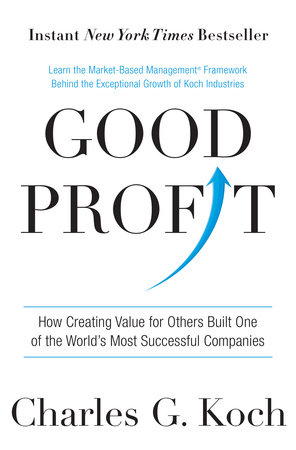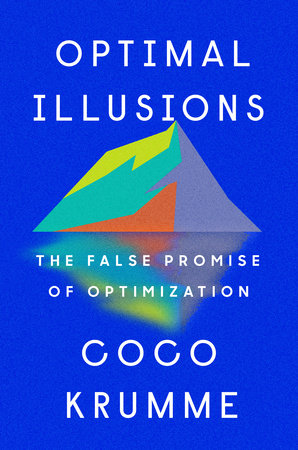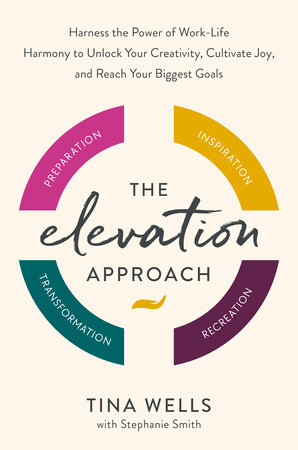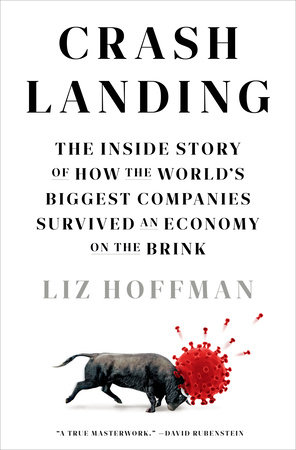Quick Summary
One Sentence Summary:
“Good Profit” by Charles G. Koch offers insights into creating value and fostering innovation within businesses based on Market-Based Management principles.
Big Idea:
The central theme of “Good Profit” revolves around the concept of Market-Based Management (MBM), a philosophy that combines the principles of free markets with organizational management to achieve sustainable long-term profits.
Five Key Ideas:
- Value Creation: The book emphasizes creating real value for customers as the core of any business, much like the ideas presented in “The Lean Startup” by Eric Ries.
- Virtue and Talents: Koch discusses the importance of hiring and nurturing individuals with the right skills and values, similar to principles in “Good to Great” by Jim Collins.
- Decision Rights: The idea that empowering employees to make decisions can drive innovation and efficiency.
- Knowledge Processes: Encourages a culture of knowledge sharing and learning, paralleling concepts in “The Fifth Discipline” by Peter Senge.
- Incentives: Aligning incentives with company goals to motivate employees, a concept also explored in “Drive” by Daniel H. Pink.
Actionable Advice:
Implement Market-Based Management principles in your organization: Focus on creating real value for customers, hire people with the right talents and virtues, empower employees, foster a culture of learning, and align incentives with organizational goals.
About the Author:
Charles G. Koch is an American businessman and philanthropist, known for his role as co-owner, chairman, and CEO of Koch Industries, one of the largest privately held companies in the United States.
Read Next:
For further reading on business management and innovation, consider “The Lean Startup” by Eric Ries for insights on creating value and “Good to Great” by Jim Collins for understanding what makes companies achieve enduring greatness.
In Depth
Value Creation
“Good Profit” revolves around a core principle: creating real value for customers. Charles G. Koch insists that value creation is the bedrock of business success. It’s not just about making money; it’s about offering something that genuinely improves the lives of your customers.
Koch emphasizes that value isn’t about the bells and whistles; it’s about solving real problems. He shares the story of INVISTA, a subsidiary of Koch Industries, which produced a fiber called Lycra®. This wasn’t just any fiber; it was revolutionary in the world of textiles, offering unprecedented elasticity. But here’s the kicker: Koch Industries didn’t push Lycra® just because it was innovative. They promoted it because it solved a real problem – discomfort in clothing. This is a prime example of value creation. They spotted a gap, a genuine need, and filled it with something that made people’s lives better.
In Koch’s words,
“To succeed, a business must profitably satisfy real customer needs.”
This quote hits the nail on the head. It’s not just about profit; it’s about “profitably satisfying” needs. That means creating something sustainable, something that people will continue to want and need.
But how do you ensure you’re creating value? Koch suggests a relentless focus on understanding your customer. It’s like putting on a pair of glasses that lets you see the world from their perspective. What are their pain points? What do they truly need? And not just today, but tomorrow, next year, and beyond. It’s almost like being a fortune teller, but instead of a crystal ball, you’re armed with deep knowledge and empathy.
Value creation also means being ready to pivot. Markets change, needs evolve, and what was valuable yesterday might not cut it tomorrow. It’s not about stubbornly sticking to your guns; it’s about agility. This is where the connection to “The Lean Startup” by Eric Ries becomes evident. Just like Ries talks about the ‘pivot’ in response to market feedback, Koch stresses on adapting your value proposition as customer needs evolve.
Creating value isn’t a one-time thing; it’s a continuous process. It’s about building relationships with your customers, not just transactions. When you focus on creating real value, you’re not just selling a product or service; you’re earning trust, loyalty, and, ultimately, a reputation that can withstand the tests of time and market shifts.
In a nutshell, value creation is about seeing your business through your customers’ eyes. It’s about asking, “How can we make their lives better?” And then, relentlessly pursuing the answer.
Virtue and Talents
Koch dives into the importance of virtues and talents in “Good Profit,” emphasizing that who you hire matters just as much as what you do. He’s not just talking about skills, but the character and values of the people you bring into your company. Think of it like picking players for a team: skills matter, but so does the ability to play well with others.
Here’s an interesting point from the book: Koch talks about hiring for values, not just skills. He believes that skills can be taught, but virtues are harder to instill. It’s like he says,
“If you can hire people who already have the values and virtues you believe in, you’re way ahead of the game.”
This quote really drives home the idea that the right people are your biggest asset. It’s not just about filling a position; it’s about finding someone who fits the culture and ethos of your company.
Let’s take a real example from Koch Industries. Koch talks about Georgia-Pacific, one of their companies, which faced a major safety challenge. The issue wasn’t just about processes; it was about mindset. They needed people who valued safety as much as productivity. So, they didn’t just change protocols; they changed the culture by bringing in people who saw safety as a virtue, not a hindrance. This shift wasn’t just good ethics; it turned out to be good business. Accidents decreased, productivity improved, and morale went up.
Hiring for virtues and talents is like putting together a puzzle. You’re looking for pieces that not only fit the current picture but can adapt as the picture changes. It’s not just about the here and now; it’s about building a team that can grow, adapt, and thrive in the future.
Koch’s emphasis on virtues aligns with Jim Collins’s principles in “Good to Great.” Just like Collins talks about getting the right people on the bus, Koch stresses on bringing in people who share your core values. It’s not just about filling seats; it’s about finding people who are heading in the same direction.
In summary, virtues and talents go hand in hand. It’s about finding people who have the skills you need and the values you cherish. This combination is the secret sauce for building a team that’s not just effective but also aligned with your vision and values. It’s about seeing beyond the resume to the person behind it.
Decision Rights
“Good Profit” throws light on a critical aspect: giving employees the right to make decisions. It’s about empowering your team, letting them call the shots where it counts. Koch isn’t talking about a free-for-all; it’s about structured freedom. As he puts it,
“Assign decision rights to those who have the knowledge and willingness to act according to the company’s vision.”
This quote underscores a fundamental truth: those closest to the action often know best. It’s not about delegating for the sake of it. It’s about recognizing expertise and judgment at every level.
Koch gives a compelling example from Koch Industries itself. They had a policy where any investment over a certain amount needed approval from the top. Sounds reasonable, right? But here’s the twist: They realized this policy was slowing them down. So, they flipped the script. They increased the limit significantly, allowing more decisions to be made on the ground. The result? Faster, more effective decisions, and a more nimble, responsive company.
This idea of decision rights echoes principles in military strategy, like the concept of “Commander’s Intent” – giving clear objectives but allowing flexibility in execution. It’s not just about telling people what to do; it’s about giving them the why and the what, then stepping back to let them figure out the how.
Granting decision rights is a leap of faith. It’s trusting your team to not just follow orders but to think, innovate, and sometimes, to fail and learn. It’s recognizing that good ideas don’t just come from the top; they can bubble up from anywhere.
When you give people decision rights, you’re doing more than streamlining processes. You’re sending a message: “I trust you.” This trust can be transformative. It can turn an average employee into a passionate innovator, a follower into a leader. It’s about unlocking potential, not just ticking boxes.
In short, decision rights aren’t just a management tool; they’re a catalyst for growth, innovation, and empowerment. It’s about betting on your people, giving them the reins, and watching them gallop.
Knowledge Processes
Koch in “Good Profit” highlights knowledge processes as a key ingredient for success. It’s not just about gathering information; it’s about sharing it, learning from it, and using it to make smarter decisions. He makes it clear:
“Foster a culture where sharing knowledge is an expectation, not an exception.”
This quote nails it. Knowledge shouldn’t be hoarded; it should flow freely. It’s about breaking down silos and fostering communication.
A standout example from the book is Koch’s own company. They implemented a knowledge-sharing system called ‘Market-Based Management’ (MBM). This wasn’t just a fancy database; it was a cultural shift. Everyone, from the intern to the CEO, was encouraged to share insights and learnings. If someone on the factory floor found a better way to do something, that knowledge was shared, analyzed, and often, implemented across the board. This system turned individual knowledge into a collective asset.
It’s like a brain trust, where every piece of knowledge, every insight, is a puzzle piece. When shared, these pieces come together to form a clearer, more comprehensive picture of what’s happening and what’s possible.
The concept parallels Peter Senge’s “The Fifth Discipline,” which focuses on building learning organizations. Just like Senge emphasizes the importance of a shared vision and team learning, Koch highlights how shared knowledge can be a game-changer.
Sharing knowledge does more than improve processes; it builds a culture of trust and respect. It says, “Your experience matters. Your ideas matter.” This can be incredibly empowering. It’s not just about having the right answers; it’s about asking the right questions, together.
In essence, knowledge processes are about turning individual smarts into collective wisdom. It’s a win-win: the company gets a wealth of insights, and employees feel valued and engaged. It’s about recognizing that the next big idea can come from anywhere and anyone.
Incentives
In “Good Profit,” Koch zeroes in on incentives. He’s crystal clear about their power: incentives can make or break a company’s success. It’s about aligning personal goals with company goals. As Koch puts it,
“When incentives are aligned with organizational objectives, it creates a powerful engine for progress.”
This quote is the heart of the matter. It’s not just about dangling carrots; it’s about making sure those carrots lead in the right direction.
Take Flint Hills Resources, a Koch company. They faced a challenge: how to improve environmental performance. Instead of just setting rules, they changed their incentive structure. They linked bonuses and promotions to environmental performance. The result? Significant improvements. People weren’t just following rules; they were actively looking for ways to be more environmentally friendly. Why? Because their success was tied to it.
This idea is straightforward but powerful. When people have a personal stake in the outcome, they’re more engaged, more creative, and more committed. It’s like aligning the stars; suddenly, everyone’s moving in the same direction, driven by a shared goal.
Incentives are like the secret sauce in a recipe. Get it right, and it can transform something good into something great. But here’s the kicker: it’s not just about financial incentives. It’s about recognition, growth opportunities, and a sense of purpose. People want to feel valued, to know their work matters.
Koch’s approach mirrors principles in Daniel H. Pink’s “Drive,” which emphasizes the importance of autonomy, mastery, and purpose as motivators. Just like Pink, Koch understands that motivation is multifaceted.
In a nutshell, incentives are a balancing act. It’s about finding the right mix of rewards that drive the behaviors you want to see. It’s about understanding what makes your people tick and using that knowledge to fuel progress. When done right, incentives can turn a group of individuals into a focused, driven team.
Actionable Advice
- Focus on Value Creation: Always aim to solve real problems for your customers. Think about what genuinely improves their lives.
- Hire for Virtue and Talent: Look beyond skills. Find people whose values align with your company’s ethos.
- Empower Decision-Making: Assign decision rights to those closest to the action. Trust their judgment and expertise.
- Encourage Knowledge Sharing: Foster an environment where sharing insights and learnings is the norm, not the exception.
- Align Incentives: Link personal and organizational goals. Use a mix of financial and non-financial incentives to motivate your team.
- Embrace Adaptability: Be ready to pivot based on customer needs and market changes. Stay agile and open to new ideas.
- Cultivate Trust: Build relationships based on trust and respect. Show your team that their ideas and contributions matter.
- Practice Continuous Learning: Encourage ongoing development and learning within your team. Embrace failures as opportunities to grow.
- Communicate Clearly: Ensure that everyone understands the company’s vision and objectives. Clear communication is key to alignment and success.
- Measure Progress: Regularly assess how well you’re implementing these principles. Adjust strategies as needed to ensure continuous improvement.
About the Author
Charles G. Koch, born in Wichita, Kansas in 1935, is an influential American businessman, political donor, and author. As the chairman and CEO of Koch Industries, he transformed his family’s small business into one of the largest privately held corporations in the United States. Koch holds a bachelor’s degree in general engineering and two master’s degrees in nuclear and chemical engineering from MIT. His business philosophy, Market-Based Management (MBM), is central to his approach, emphasizing the importance of creating value, innovation, and entrepreneurial spirit. A prominent libertarian, Koch advocates for limited government and free-market policies. Alongside his business pursuits, he is a major philanthropist, supporting education, research, and policy institutes. His beliefs are rooted in the power of individual liberty, the importance of personal responsibility, and the role of free markets in driving prosperity and well-being.
Read These Next
You might like these similar books
- “The Outsiders” by William N. Thorndike
- “Good to Great” by Jim Collins
- “The Fifth Discipline” by Peter Senge
- “Drive: The Surprising Truth About What Motivates Us” by Daniel H. Pink
- “The Lean Startup” by Eric Ries
FAQ
Q: What is “Good Profit” about?
A: “Good Profit” is about Charles Koch’s business philosophy and the principles of Market-Based Management (MBM). It offers insights into creating value, decision-making, and fostering a culture of innovation.
Q: Who is Charles G. Koch?
A: Charles G. Koch is an American businessman, CEO of Koch Industries, and the author of “Good Profit.” He’s known for his libertarian views and Market-Based Management approach.
Q: Is “Good Profit” suitable for small business owners?
A: Yes, small business owners can find valuable insights in “Good Profit,” especially regarding value creation, decision-making, and team empowerment.
Q: Does the book include real-world examples?
A: Yes, Charles Koch uses examples from his own experience at Koch Industries to illustrate his points in “Good Profit.”
Q: What is Market-Based Management (MBM)?
A: MBM is a business philosophy that emphasizes creating value, rewarding contribution, and encouraging personal initiative. It’s a key concept in “Good Profit.”
Q: Can non-business professionals benefit from reading this book?
A: Yes, “Good Profit” offers insights into leadership, decision-making, and value creation that can be beneficial beyond the business world.







